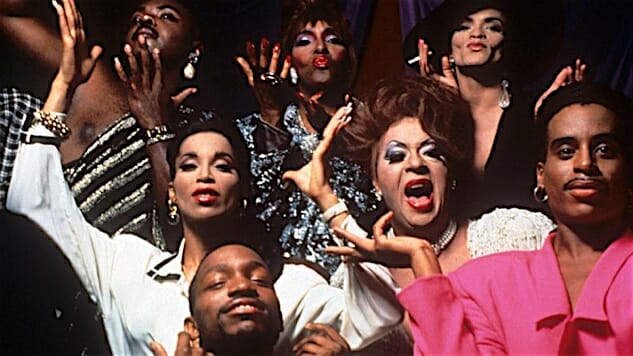Paris Is Still Burning: What if We Loved Black Queers as Much as We Love/Steal from Black Queer Culture?

A fellow alumni from Sarah Lawrence College was recently shocked and confused to learn that I’d spent four years (give or take, ahem) at our school and had somehow never seen the documentary Paris Is Burning. Even after attending one of the queerest schools in America, then going to become a mother, a film and TV critic and now a TV writer, I’d managed to miss Jennie Livingston’s beloved film about the queer ballroom culture that reigned in 1980s Harlem. Although I certainly had known enough not to attribute voguing to Madonna, I was completely ignorant of the impact of this particular world on those who participated in it, those who bore witness and on American culture today.
As a black woman, I rarely feel like I’m appropriating someone else’s culture, but in watching Paris Is Burning for the first time, I realized that so much of what I associate with black women and black culture belongs to and was birthed by queer culture. We all know that these worlds are not, and have never been, mutually exclusive, but origin stories—especially in this country—are integral to our worldview, and more specifically, to the way we behave and speak.
Post-Paris, I’m not sure that you should, for example, be permitted to use the word “shade” without having seen this movie. I certainly feel guilty that I have, especially knowing that one of the first times I heard the word was from Lil’ Kim, and so I always think of her “Crush On You’ verse when I hear the term “throw shade.” But that seems wrong now, or at least historically inaccurate. It seems better, rather, that I should hear “shade” and picture the emcee Junior LaBeija shouting from his pulpit. And while it’s true that the people we meet in Paris Is Burning didn’t invent the term (or those others—werk, yas queen, etc.), it feels so important to associate them with these words, to know from whom I’m borrowing when I use them, or when I engage with their constant usage on social media.
“Why y’all gagging so?” —Junior LaBeija
Post-Paris, today’s homophobia and queer and trans-antagonism becomes all the more infuriating. Like so many other great stories, the 1990 documentary is a tragedy. It is the tragedy of families and houses born out of the rejection of biological families; the tragedy of the great Venus Extravaganza; and the tragic loss of many of the film’s participants, like Willi Ninja, to AIDS and AIDS-related illnesses. So what I’m wondering is how we can live in a culture that loves and openly steals from their world, and yet remains a hostile environment for black and Latino queers. I’m wondering how many trans black women were killed last year by people who have, in some way, benefited from queer culture? Why are we still not living in a world where black queers everywhere have equal access to health care, education and all the necessary tools required to bring a permanent end to AIDS? I’m wondering what would happen if we loved black queers as much we love/steal from black queer culture?
We are 25 years on from the release of Paris Is Burning and while HIV acquisition has been stemmed across much of the LGBT community, in America 43 per cent of new HIV infections in the queer community are black gay men specifically. In this fact alone, it is clear the stranglehold of oppression around the Paris Is Burning cast did not wither when they went to their graves but still holds power in the communities from which they came. —Shon Faye, Looking at Paris Is Burning 25 Years After Its Release
I’m riddled with questions after my first Paris Is Burning experience: Is there anything more American than stealing from a culture and then leaving them to die—or violently killing them with your bare hands? Are we really moving towards a place where our black and Latino queer family will be treated as true family? How can we even effectively measure our progress, especially when we are still attributing so much of their work to the onset of Beyoncé, or worse, Broad City?
-

-

-

-

-

-

-

-

-

-

-

-

-

-

-

-

-

-

-

-

-

-

-

-

-

-

-

-

-

-

-

-

-

-

-

-

-

-

-

-








































